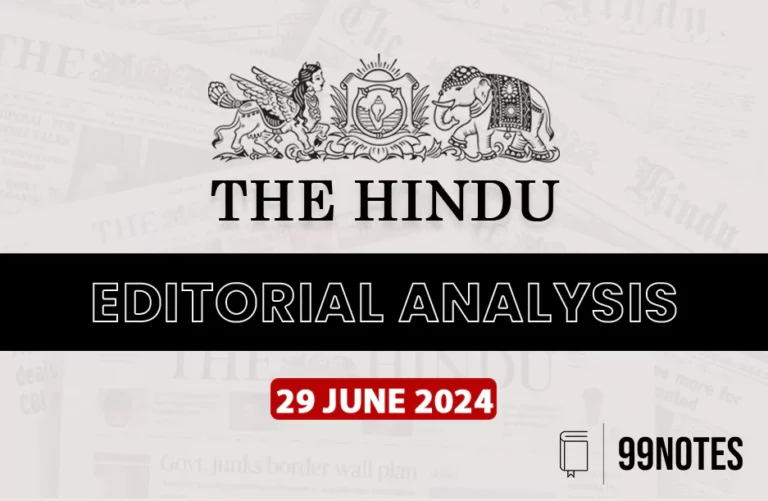21 November 2024 : Indian Express Editorial Analysis
1. Free market needs free speech
(Source: Indian Express; Section: The Ideas Page; Page: 13)
| Topic: GS2 – Governance |
| Context: |
| SEBI’s proposal to regulate digital platforms disseminating securities-related information raises concerns about free speech, jurisdictional overreach, and the balance of regulatory powers. |
SEBI’s Proposal and Its Implications
- The Securities and Exchange Board of India (SEBI) has proposed a new regulatory framework to oversee digital platforms like YouTube and WhatsApp that disseminate securities-related information.
- Under this framework, SEBI-regulated intermediaries could only collaborate with financial influencers (“finfluencers”) adhering to SEBI guidelines.
- These platforms would also be tasked with actively monitoring and blocking misleading content, blacklisting entities flagged by SEBI, and regularly reporting to the regulator.
- While this proposal aims to protect investors from misinformation, it raises significant concerns about the regulation of speech, expansion of SEBI’s powers, and parliamentary oversight.
Impact on Price Discovery in Securities Markets
One of the key public goods of securities markets is their role in price discovery—a process that thrives on the diversity of market participants’ views. Limiting or regulating speech can disrupt this mechanism.
Example: The Adani-Hindenburg Case
- When Hindenburg Research alleged overvaluation of Adani Group firms, it sparked a debate involving promoters, analysts, and investors. Each viewpoint added to the market’s understanding, enabling participants to make informed decisions.
- Regulating or pre-empting any side’s dissemination of views would have deprived the market of crucial information, skewing price signals and undermining trust in the market.
Role of Diverse Opinions
- Markets operate best when a spectrum of views—optimistic, pessimistic, or neutral—are freely expressed. Speculators and analysts build credibility over time through their accurate predictions.
- Curtailing this flow of opinions risks stifling “good” speculation, leaving investors with fewer tools to navigate the market.
SEBI’s Existing Powers: Addressing Misleading Speech
SEBI already has a robust framework to address fraudulent or misleading speech in the securities market.
Legislative Measures Since 2003
- Regulations under the SEBI Act prohibit fraudulent, manipulative, or deceptive speech related to securities.
- Misleading advice or false information, especially when shared through digital media, is classified as a violation.
- Over time, SEBI has expanded its definitions to include negligent behavior, eliminating the need to prove intent or knowledge.
Regulations on Advisors and Analysts
- SEBI mandates registration for those providing securities-related advice or opinions, requiring them to pass qualifying exams and meet stringent criteria.
- These rules effectively encompass finfluencers, ensuring accountability. SEBI has successfully penalized unregistered finfluencers, demonstrating its capacity to address these issues without additional powers.
Challenges with Expanding SEBI’s Powers
The proposal raises questions about jurisdictional overreach and the balance of regulatory power.
Lack of Clear Justification
- SEBI’s existing powers are sufficient to penalize misleading speech and regulate market participants. Extending its authority to digital platforms appears unnecessary.
Jurisdictional Overlap with MeitY
- Digital platforms fall primarily under the purview of the Ministry of Electronics and Information Technology (MeitY) through the IT Act, which addresses misinformation.
- SEBI’s attempt to regulate these platforms risks creating conflicts with MeitY and diluting accountability.
Need for Parliamentary Oversight
- Any significant expansion of SEBI’s jurisdiction, especially over non-market intermediaries like digital platforms, must be legislated by Parliament.
- Circulars, as proposed by SEBI, lack the scrutiny and democratic legitimacy necessary for such measures.
Free Speech and Regulatory Overreach
The regulation of speech in the securities market must meet a high threshold, given its potential to infringe on the constitutional right to free speech.
Balancing Speech and Investor Protection
- While misinformation can harm investors, regulating speculative or opinionated speech risks suppressing legitimate discourse. The line between harmful speech and beneficial debate is often blurred, requiring a cautious approach.
Concerns About Unilateral Authority
- Empowering an unelected regulatory body like SEBI to curtail speech without sufficient oversight undermines democratic principles. A marketplace of ideas thrives on minimal interference, where credibility is determined by the audience, not regulators.
Conclusion: Reconsidering SEBI’s Proposal
- SEBI’s consultation paper reflects its belief in the marketplace of ideas but simultaneously risks undermining it with excessive control.
- To protect investors effectively, the focus should remain on enforcing existing regulations rather than expanding SEBI’s jurisdiction unilaterally.
- Parliamentary oversight and inter-agency coordination are critical to ensuring that any new measures strike the right balance between protecting investors and preserving free speech.
| What is SEBI? |
|
|
PYQ: Which of the following is issued by registered foreign portfolio investors to overseas investors who want to be part of the Indian stock market without registering themselves directly? (2019) (a) Certificate of Deposit (b) Commercial Paper (c) Promissory Note (d) Participatory Note Ans: (d) |
| Practice Question: Discuss the implications of SEBI’s proposal to regulate digital platforms for disseminating securities-related information on free speech, market efficiency, and the jurisdiction of regulatory bodies in India. (250 words/15 m) |


